Chris Wilder Exclusive: My journey from Sunday League to taking Sheffield United to the Premier League

After leading Northampton Town to the League Two title in 2016, Chris Wilder had elevated his managerial stock to new heights.
Rumours were rife that Bolton and Charlton, who had both just been relegated from the Championship, were on the hunt for Wilder’s signature as they each sought a swift return to the second-tier.
“I was due for a press conference in London at 2 o’clock and I was intercepted along the way,” Wilder explained to The Sack Race.
“The night before I received a phone call that I wasn’t expecting: ‘Would you be interested in speaking to the board of directors at Sheffield United in London on the Tuesday morning?’.
“I met them at 8 o’clock and about half-an-hour later I was asked to leave the room. I walked into a side room with my assistant Alan Knill, who’d been in the interview with me, and turned to him and said: ‘I think we’ve got this job and we’re going to have to take it.’
“It was always talked about by a lot of my friends and people that I knew in Sheffield, but obviously I’d never coveted it, yet I knew that if I got offered the job I’d never forgive myself if I didn’t take it.
“So I came back into the room, and was then offered the job. I was obviously proud and delighted to be given the opportunity of managing this famous football club.
“I then had to make a difficult phone call to Charlton...which somebody else did - that’s why you’ve got agents!”
Wilder’s managerial career spans nearly 20 years; from the ninth-tier of England’s league ladder right up to the dizzying heights of the Premier League.
During this time Wilder has enjoyed title triumphs, promotions, a quadruple, an LMA Manager of the Year accolade, and more recently he was crowned The Sack Race’s Manager of the Decade (2010 to 2019).
It’s remarkable to think that the boss started the previous decade in the Blue Square Premier when his Oxford side faced Tamworth in early 2010, only to then end the decade at the helm of his boyhood club Sheffield United who finished 2019 with a match against Pep Guardiola’s defending champions Man City. What a memorable managerial journey it has been, and continues to be.
“Life is good I can’t complain, I’m enjoying the ride,” beamed Wilder on a chilly yet unusually sun-soaked blue-skied January morning at the Sheffield United Football Academy, where The Sack Race has come to discuss his time in management.
“There’s been ups and downs in my managerial career but I’ve enjoyed every bit of it. I’ve loved every club I’ve worked for and met some fabulous and wonderful people along the way.
“I’ve always loved football. If there was a game on the other side of the road I’d go and watch it. Something I’ve never understood is when some professional footballers say they don’t like football.
“I used to go and watch my pals play at Bradway FC. I then started to take them training on a mid-week night. I would get up on a Sunday morning and pick the team. I just liked being involved with my pals really. From then it was sort of a natural progression into management. I believe quite a few managers have done something similar.”
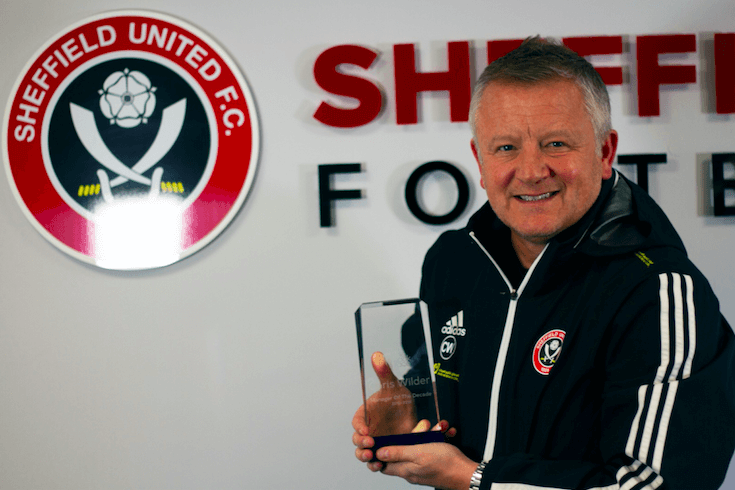
Alfreton Town: The Quadruple
After getting a taste for management with Sunday League side Bradway FC, Wilder then bagged his first job with Alfreton Town, who at the time played their football in the Northern Counties (East) League Premier Division.
What a flying start to life in the managerial arena it was too, as Wilder went on to win four trophies in the space of 27 weeks.
“Someone I know locally asked me to come and play for Alfreton Town who were having a bit of a tough time. I was then invited to chuck my hat in the ring in regards to taking over as manager.
“It was a difficult one as I was basically taking the job off the lad who brought me in so it was quite a tough decision to make but the lad in question said ‘go for it’. The club obviously knew I’d taken the initial early steps into management, so I became player-manager and really enjoyed it.
“It’s a good club with one of the best Chairmen that I’ve had throughout my career. The relationship between manager and Chairman is so important and crucial.
“We had a bit of momentum and went on an incredible run and were very successful. We had a strong squad, and I called in a few favours to bring in some pals too, such as John Beresford who played at Newcastle. It was an incredible seven months.”

Halifax Town: No players, training ground or kit
Wilder’s success caught the attention of one of his former clubs, Halifax Town, where he’d finished his playing career.
“I had a tough decision because Halifax had just dropped out of the Football League. Do I stay at Alfreton who had really good players and a chairman that gave me everything? Or do I take the leap into full-time football straight away?”
Wilder opted for the latter and went on to spend six years at the helm of Halifax, during which his managerial skills were tested to the maximum with the club engulfed in financial difficulty.
“I could have sat comfortable at Alfreton. Halifax was on its knees but thankfully they got saved by 10 local businessmen who all put £10,000 in each to keep it alive in the Conference.
“I walked into the club and there were no players, no facilities, no kit, no equipment, nothing! So in a way it was a blank canvas but obviously there was a lot of work to do, and my first job was to get a team out for the first game of the season.
Halifax were forced to dissolve in 2008, just three years before what would have been their centenary year, but despite the numerous difficulties he faced Wilder did manage to lead the club into the Conference play-off final in 2005/06.
“I had huge experiences at Halifax in those six years which were incredible. For us to have got to a play-off final in that period was head-scratching because of the situations that we had, unfortunately historical debt killed the club.”
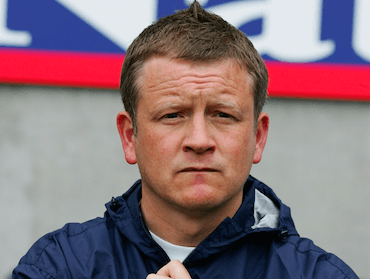
Oxford: That confidentiality agreement
Wilder then had a breather from management, but not from football, as he was invited to become assistant manager to Bury boss Alan Knill, with whom he played with at Southampton.
But soon enough the lure of being an outright manager proved to be too strong, and six-months after leaving Halifax he was back in the dugout, this time with Oxford United who were bidding to orchestrate a return to the Football League.
Wilder completed the promotion mission, then stabilised Oxford in League Two, but then just when it looked like he could mount a promotion push into League One he surprisingly left mid-way through his sixth season in order to take charge of Northampton.
At the time the U’s were in the League Two play-off places, while Wilder’s new club Northampton were struggling down in the relegation zone, six points adrift of safety.
“I’d shaped that football club [Oxford]. It was a brilliant football club. It’s one of the things that really disappointments me because I left on a really sour note and it shouldn’t have been the way, in my opinion.
“I didn’t have the opportunity of explaining [why he left] as I had to sign a confidentiality agreement. I think that speaks volumes for the reason.
“We were around 2nd in the division at Christmas time [2013] with a budget that wasn’t even halfway in the division [League Two]. There were a lot of changes, a lot of people had left that had been a part of my appointment - Jim Smith, Jim Rosenthal and more importantly the chairman Kelvin Thomas had departed - as there was a change of direction for the football club.
“I think maybe the time was right as well from the supporters point of view, they needed a freshen up and a change. The team certainly needed an investment, which it got when there was a change of ownership, and Michael Appleton came in [as manager] and did fantastically well and moved the club forward.
“Oxford didn’t quite go the way I wanted it to but it was still a great learning curve. The people I met down there, the players I brought to the football club, and the achievement of getting out of the Conference which is such a tough division. The Wembley appearance with 33-34,000 Oxford fans and the last minute goal to win the game will always live with me. I’m proud of my record at that football club.
“I could possibly have done better in one of the seasons when we missed out but really I was content with my achievements there. But as always, you’ve got to look for the next challenge and it surprised quite a few people at the time because Northampton were cut adrift at the bottom of League Two.”
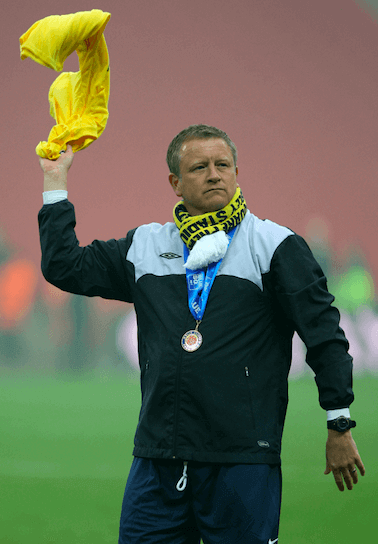
Northampton: From the relegation zone to title success
What a decision it proved to be as Wilder made an instant impact, as he led Northampton to safety after beating Oxford - of all teams - on the final day of the season, before inspiring a top-half of the table finish in his first full campaign.
Then, quite unbelievably, the Cobblers romped to the League Two title by a margin of 13 points, with Oxford a distant 2nd.
So how did Wilder transform a confidence-crushed environment into a winning one, achieved under the threat of a winding-up petition and a lack of payslips through the post?
“It was an incredible achievement by everybody. I went into the football club and thought that it had some legs in it: it had a good support and a good group of players. First and foremost I looked at the fixture list and the last game of the season was against Oxford United at home.
“They went 1-0 up after about five minutes and you just think ‘here we go’ but we pulled it around. I was delighted as it was a major achievement for everybody concerned. We went on a great run towards the end of the season, and to turn it around in the manner that we did was incredible.
“We stabilised it the next year then obviously there was the bombshell at the start of the season after that. We brought in players, invested into the team, then all of a sudden a situation came about where players weren’t getting paid. I think this is where my experience in those six years at Halifax Town helped me.
“The players had a decision to make. They could use it [financial problems] as an excuse or use it to their favour and stick together to try and achieve something that’s against the odds, and they certainly did that. It galvanised the football club.
“The PFA, who were exceptional, stepped in and looked after the club and supported the players through payments. The biggest thing for me was that the non-playing staff weren’t getting paid, but what was evident at that time was their undying love for the football club. People had been there for years and years - secretaries, press offices, people that work in the kitchen, ticket office and club shop - they were all prepared to stick by the football club.
“Thankfully my old Chairman at Oxford [Kelvin Thomas] got a consortium together and came in and saved the club. It got resolved and the finish to the season was magnificent with 99 points - I’m very proud of our achievements.”
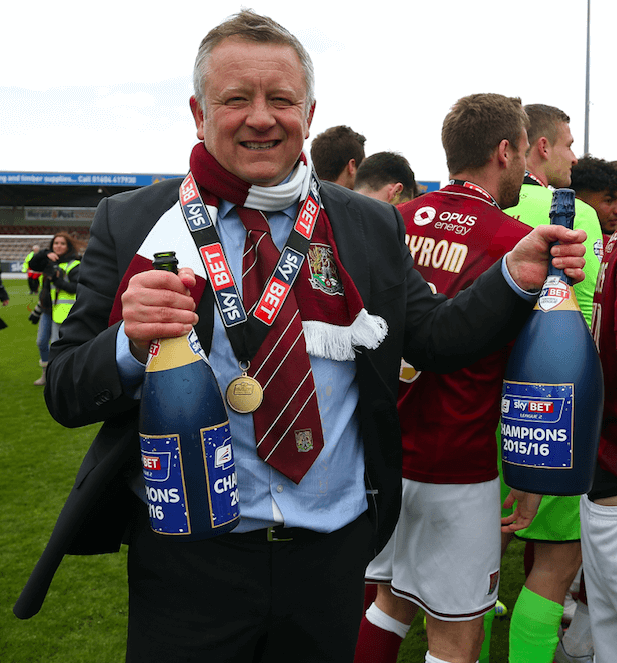
Sheffield United: How to unearth a hidden gem
As discussed earlier, Wilder then turned down an offer from Charlton in order to return to his beloved Sheffield United as manager, after the club swooped in at the last minute following the departure of Nigel Adkins.
In the space of three-and-a-half-years Wilder has galvanised the city - well half of it - reconnected the club with the fans and led the Blades from League One up to the Premier League. Let’s not forget the individual honour he received, after he scooped the LMA Manager of the Year award (2019) ahead of a certain Pep Guardiola.
🏆 LMA Manager of the Year.
— Sheffield United (@SheffieldUnited) May 15, 2019
🏆 LMA Sky Bet Championship Manager of the Year.
🏆 EFL Manager of the Year.
🏆EFL Sky Bet Championship Manager of the Year.
✅ Promotion to the @premierleague.
Chris Wilder 👏🏻 pic.twitter.com/SRQgW4kYzi
One particular area that Wilder’s thrived in is the recruitment of players, which can often make or break a manager. John Fleck, David McGoldrick and Enda Stevens were all snapped up on free transfers, George Baldock and John Lundstram were both purchased for under £1m, while Ollie Norwood was a snip at £2m.
But it’s not just Wilder’s keen eye for a player that has proved exceptional, but his ability to improve players and encourage them to reach their potential, with the likes of Fleck, Jack O’Connell and Chris Basham progressing up the league ladder with Wilder; from the third-tier to the glitz and glamour of the Premier League.
So what’s Wilder’s secret?
“It’s the whole package, the people I work with are very well respected and work very hard at their jobs. There’s Alan Knill and my coaching staff, then Paul Mitchell and the recruitment.
“We’re not a chequebook football club. We have to work hard and look to see who fits in from a lot of aspects. We’re a football club that tries to improve football players on a Monday to Friday, through coaching and every other aspect.
“If you don’t sign good players and they don’t fit into your system, or they’re not the right people from an attitude or character point of view, then you’re going to fail. We don’t always get it right but we’ve had to get a lot right.
“I think the players deserve an enormous amount of credit as well. They’re the ones that have to take in the information which we give them to help them improve their game, and they then put into practice on a match day. I’m very proud of them.
“You don’t get prizes for spunking money! The key is to get value for money out of the players and maximize your budget.”
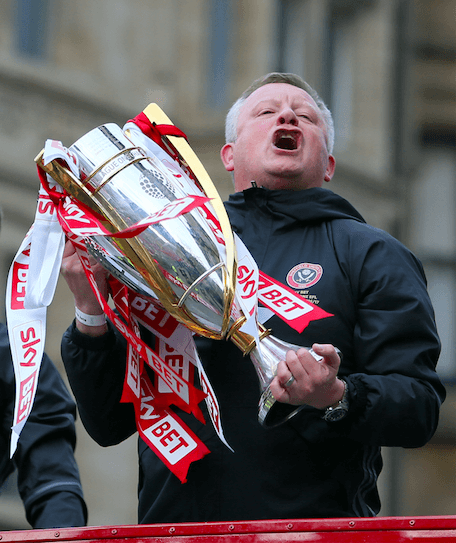
The Manager: In his own words
Current players, former players and pundits alike have described Wilder as an excellent man-manager, whose tactically astute and hugely ambitious. But how would the man himself describe his managerial style?
“I’m hugely ambitious. You’ve got to be adept and good at all aspects of the game.
“From a tactical point of view you’re up against world class tacticians so you’ve got to make sure that you’re spot on in your approach to the game, with and without the ball.
“Technically, you’re up against the world’s best players so your players have got to improve and be good enough to deal with that side of it.
“Physically, you’ve got to get the players into supreme condition, certainly in the Premier League. The distances the athletes in this division cover and the high intensity runs that they produce is incredible.
“Mentality is huge, as is the connection between myself and the players. Their approach to their work and how they go about their business is pivotal. I’ve tried to always encourage their connection with the supporters, and bring everyone together.
“It’s a powerful football club when everyone gets together.”

Managerial Influences: From Chris Kamara to Lawrie McMenemy
During his playing career Wilder was managed by the likes of Dave Bassett and Steve Bruce (both Sheffield United), Sam Allardyce (Notts County), Lawrie McMenemy (Southampton) and even Chris Kamara (Bradford), but was there anyone in particular that stood out when it came to influencing his own managerial style?
“You’ve always got to be yourself and take the lead. There’s nothing in it for copying anybody or trying to mimic anybody. You’ve got to have your own beliefs but I’d be daft not to look at my former managers, who I’ve picked bits and pieces off through my career.
“From my first run as a kid at Southampton under Lawrie McMenemy, there are traits that I learnt then that I’ve still got in me now.
“On the other hand there’s other things I’ve seen which are perhaps not so good, which I’ve opted not to take with me.
“Even looking now I look at how other managers interact with players and the messages that they give out. The learning never stops.”
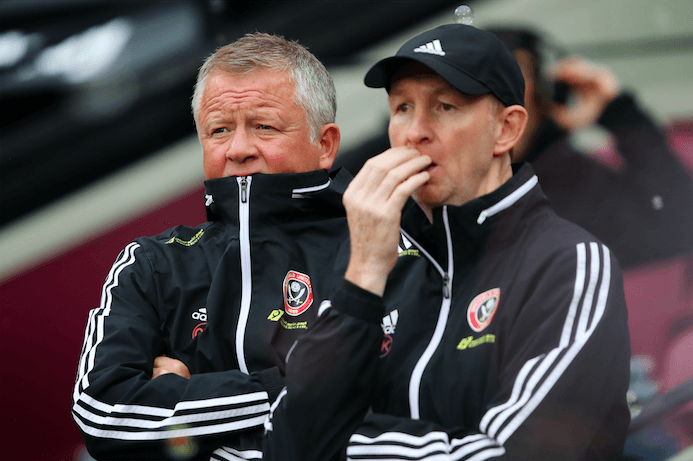
Wilder & Knill: The new Clough & Taylor?
Wilder’s partnership with his assistant Alan Knill has been compared with the famous duo of Brian Clough and Peter Taylor due to their immense success over the last four years.
The pair first met as players at Southampton, then Wilder later become Knill’s assistant at Bury when in between jobs at Halifax Town and Oxford. The roles were then switched in 2014 when Knill became Wilder’s assistant at Northampton, and they’ve thrived ever since.
So, what is it that makes the duo tick?
“Alan’s a good guy and a pal of mine. It’s not 24/7 but like all the staff here he’s outstanding at his job and I think that’s key. In terms of the recruitment of staff you need to get good people around you.
“It’s a comfort to me when you hear the likes of Jurgen Klopp talk about his staff who he surrounds himself with, they’re fantastic in terms of their contribution to the whole situation which is preparing the players and giving themselves the best opportunity to win football games.
“I’m very indebted to my staff and especially Alan whose driven and fantastic at his work. We are a really tight group who work together, we’re very inclusive of everybody. Obviously I’ve got to make the final decision and I’m at the front of everything so I take the bits when it doesn’t go well, and take the stuff when it does. We are all ambitious to take this club forward.”
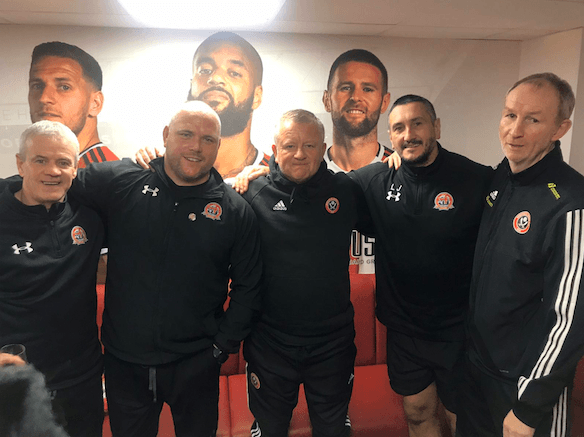
Manager Meet-Ups: Pints with Klopp
Chris Wilder was spotted having a catch-up with AFC Fylde manager Jim Bentley - check out his In The Manager’s Office here - after the FA Cup third round clash at Bramall Lane in January. Is this something that still happens in the Premier League?
“Yeah a couple but not as many as I had with Jim in our past meetings,” revealed Wilder when asked if he’d ever shared a beer with Jurgen Klopp.
“In the Championship everybody was in everybody's office. I think there’s a bit more of a connection with those managers, than in the Premier League. But it is refreshing when you do get invited in. I always invite everybody in for a glass of beer or whatever, but not always do they take up that invitation.
“I was in Mikel Arteta’s office at Arsenal, and in with Jurgen Klopp as well. There’s been other guys too but I’ll keep them to myself. I’ve not been in Pep Guardiola’s office yet but I’ve got no issue with that, it’s different cultures and different ways and that’s fine. I think there’s huge respect amongst everybody in the Premier League.”



